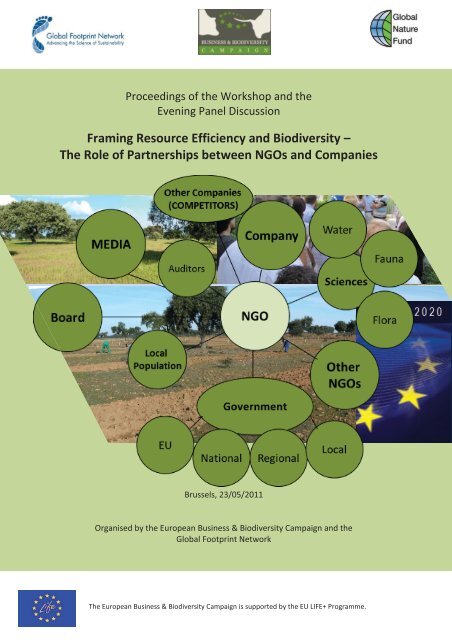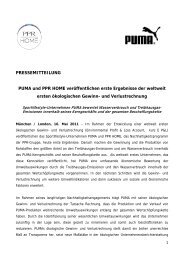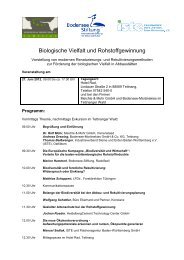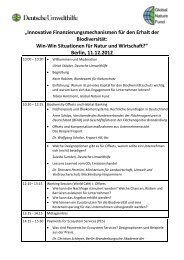here - the European Business and Biodiversity Campaign!
here - the European Business and Biodiversity Campaign!
here - the European Business and Biodiversity Campaign!
Create successful ePaper yourself
Turn your PDF publications into a flip-book with our unique Google optimized e-Paper software.
Proceedings of <strong>the</strong> Workshop <strong>and</strong> <strong>the</strong><br />
Evening Panel Discussion<br />
Framing Resource Efficiency <strong>and</strong> <strong>Biodiversity</strong> –<br />
The Role of Partnerships between NGOs <strong>and</strong> Companies<br />
Brussels, 23/05/2011<br />
Organised by <strong>the</strong> <strong>European</strong> <strong>Business</strong> & <strong>Biodiversity</strong> <strong>Campaign</strong> <strong>and</strong> <strong>the</strong><br />
Global Footprint Network<br />
The <strong>European</strong> <strong>Business</strong> & <strong>Biodiversity</strong> <strong>Campaign</strong> is supported by <strong>the</strong> EU LIFE+ Programme.
Proceedings of <strong>the</strong> Workshop <strong>and</strong> <strong>the</strong> Evening Panel Discussion Framing Resource Efficiency <strong>and</strong> <strong>Biodiversity</strong> –<br />
The Role of Partnerships between NGOs <strong>and</strong> Companies<br />
Held in Brussels, Belgium, 23/05/2011<br />
Editors: Stefan Mielke, Joost Bakker, Tobias Hartmann, Benita Heinze<br />
Date: 17 August 2011<br />
Global Footprint Network<br />
Geneva Office<br />
International Environment<br />
House 2<br />
7-9 chemin de Balexert<br />
1219 Geneva<br />
Switzerl<strong>and</strong><br />
Tel: +41 (0)22 797 41 08<br />
www.footprintnetwork.org<br />
Global Nature Fund<br />
Bonn Office<br />
Kaiserstraße 185-197<br />
D-53113 Bonn<br />
Germany<br />
Tel: +49-(0)228 18 48 6940<br />
www.globalnature.org<br />
The <strong>European</strong> <strong>Business</strong> & <strong>Biodiversity</strong> <strong>Campaign</strong> is supported by<br />
<strong>the</strong> EU LIFE+ Program
Table of Contents____________________________________________________________________________<br />
Framing Resource Efficiency <strong>and</strong> <strong>Biodiversity</strong> –<br />
The Role of Partnerships between NGOs <strong>and</strong> Companies<br />
Table of Contents<br />
Table of Contents .................................................................................................................................... 1<br />
I. Introduction .......................................................................................................................................... 2<br />
II. Programme .......................................................................................................................................... 3<br />
III. Presentations ...................................................................................................................................... 4<br />
1. The Policy context: <strong>Biodiversity</strong> <strong>and</strong> resource efficiency ................................................................ 4<br />
2. Mainstreaming of biodiversity in <strong>the</strong> business sector in Europe .................................................... 5<br />
3. Success factors <strong>and</strong> pitfalls of partnerships between NGOs <strong>and</strong> companies ................................. 6<br />
4. How can NGOs design partnerships with companies? Some practical advice ............................... 7<br />
5. Lake Constance Foundation <strong>and</strong> Rewe ........................................................................................... 8<br />
IV. World Café Results ............................................................................................................................. 9<br />
V. Conclusion ......................................................................................................................................... 11<br />
1
I. Introduction____________________________________________________________________________<br />
I. Introduction<br />
The <strong>European</strong> <strong>Business</strong> & <strong>Biodiversity</strong> <strong>Campaign</strong> organised toge<strong>the</strong>r with <strong>the</strong> Global Footprint<br />
Network a workshop for NGOs all over Europe on May 23, 2011 in Brussels. The one-day workshop is<br />
<strong>the</strong> first of a series of workshops <strong>and</strong> discussed issues regarding resource efficiency <strong>and</strong> biodiversity,<br />
<strong>and</strong> <strong>the</strong> role of partnerships between NGOs <strong>and</strong> companies in Europe. The o<strong>the</strong>r workshops will be<br />
held between <strong>the</strong> second half of 2011 <strong>and</strong> 2012 in Germany, Spain <strong>and</strong> Romania.<br />
In early 2011 <strong>the</strong> <strong>European</strong> Commission launched “A resource-efficient Europe” as one of its seven<br />
2020 flagship initiatives. An important element of resource<br />
efficiency is <strong>the</strong> efficient <strong>and</strong> sustainable use of biological<br />
resources. Over <strong>the</strong> next few months, <strong>the</strong> input from NGOs <strong>and</strong><br />
companies will be crucial in <strong>the</strong> framing of this initiative. With<br />
<strong>the</strong> recent outcomes of <strong>the</strong> Convention on Biological Diversity<br />
COP 10 in Nagoya, <strong>the</strong> <strong>European</strong> Commission <strong>and</strong> <strong>the</strong> 27 EU<br />
Member States have underlined <strong>the</strong> involvement of companies<br />
in advancing <strong>the</strong> biodiversity agenda. The <strong>European</strong> Commission<br />
recently presented its 2020 <strong>Biodiversity</strong> Communication, which<br />
foresees an increased mainstreaming of biodiversity in <strong>the</strong><br />
business sector.<br />
Within this policy context, establishing a clear underst<strong>and</strong>ing of<br />
<strong>the</strong> roles <strong>and</strong> responsibilities of companies <strong>and</strong> NGOs becomes<br />
eminent. This workshop explored <strong>and</strong> extracted lessons learned<br />
from passed <strong>and</strong> ongoing partnerships between NGOs <strong>and</strong> companies in <strong>the</strong> field of biodiversity <strong>and</strong><br />
resource efficiency <strong>and</strong> thus laid <strong>the</strong> foundation <strong>and</strong> provided advice on future partnerships. This<br />
workshop was be open for NGOs only.<br />
Key topics were:<br />
� Providing up to date information about “business <strong>and</strong> biodiversity” initiatives within <strong>the</strong><br />
emerging 2020 <strong>European</strong> policy context.<br />
� Exchanging experiences of <strong>and</strong> determining conditions for partnerships between NGOs <strong>and</strong><br />
companies to improve resource efficiency <strong>and</strong> conserve biodiversity.<br />
� Establishing criteria for successful partnerships between NGOs <strong>and</strong> companies.<br />
2
II. Programme____________________________________________________________________________<br />
II. Programme<br />
Time Topic Speakers<br />
10.00-10.20 � Welcome<br />
Wiebke Herding<br />
� Round of introductions<br />
(ON:SUBJECT)<br />
10.20-10.30 � Short presentation of <strong>the</strong> <strong>European</strong><br />
Stefan Hörmann<br />
<strong>Business</strong> & <strong>Biodiversity</strong> <strong>Campaign</strong><br />
� Goals of <strong>the</strong> workshop<br />
(Global Nature Fund)<br />
10.30-10.35 � Agenda of <strong>the</strong> workshop<br />
� Listening tasks<br />
10.35-10.50 The policy context: <strong>Biodiversity</strong> <strong>and</strong> resource<br />
efficiency – an enabling environment for<br />
partnerships between NGOs <strong>and</strong> companies<br />
10.50-11.05 Mainstreaming of biodiversity in <strong>the</strong> business<br />
sector in Europe – B&B Initiatives as a catalyst<br />
Wiebke Herding<br />
(ON:SUBJECT)<br />
Sebastian Winkler<br />
(Global Footprint Network)<br />
Daan Wensing<br />
(IUCN The Ne<strong>the</strong>rl<strong>and</strong>s<br />
Leaders for Nature)<br />
11.05-11.15 Short break<br />
11.15-11.30 � Presentation of listening tasks Wiebke Herding<br />
(ON:SUBJECT)<br />
11.30-11.45 Success factors <strong>and</strong> pitfalls of partnerships<br />
Stefan Mielke<br />
between NGOs <strong>and</strong> companies<br />
(Global Nature Fund)<br />
11.45-12.20 � Plenary discussion Wiebke Herding<br />
(ON:SUBJECT)<br />
12.20-13.30 Lunch break<br />
13.30-15.00 World Café: How can NGOs <strong>and</strong> companies work<br />
toge<strong>the</strong>r to reverse biodiversity loss <strong>and</strong> bring<br />
about a resource-efficient Europe?<br />
� 3 rounds à 25 min<br />
15.00-15.30 � Presentation of World Café results Wiebke Herding<br />
(ON:SUBJECT)<br />
15.30-16.00 Coffee break<br />
16.00-16.40 How can NGOs design partnerships with<br />
Am<strong>and</strong>a del Rio Murillo<br />
companies? – Some practical advice<br />
(Fundacion Global Nature),<br />
Sam Tarrant (RSPB)<br />
16.40-17.00 � Plenary discussion Wiebke Herding<br />
(ON:SUBJECT)<br />
17.00-17.10 � Wrap-up Stefan Mielke<br />
(Global Nature Fund)<br />
17.10-17.30 � Closing round Wiebke Herding<br />
(ON:SUBJECT)<br />
3
III. Presentations: Policy Context: <strong>Biodiversity</strong> <strong>and</strong> resource efficiency – Sebastian Winkler__________________<br />
III. Presentations<br />
1. The Policy context: <strong>Biodiversity</strong> <strong>and</strong> resource efficiency<br />
Presentation by Sebastian Winkler, Global Footprint Network<br />
Sebastian provided an overview of <strong>the</strong> evolving global <strong>and</strong> EU policy context which potentially would<br />
entail greater collaboration between companies <strong>and</strong> NGOs. At <strong>the</strong> global level <strong>and</strong> in <strong>the</strong> lead up to<br />
Rio+20, <strong>the</strong> Green Economy (UNEP) <strong>and</strong> Green Growth (OECD) initiatives are key policy areas. At <strong>the</strong><br />
<strong>European</strong> level, this is expressed through <strong>the</strong> Resource Efficiency Strategy, one of <strong>the</strong> seven EU 2020<br />
flagship initiatives. The strategy aims to transform <strong>European</strong> production <strong>and</strong> consumption towards<br />
resource-efficiency. In September 2011, <strong>the</strong> Commission will publish a roadmap of how to achieve<br />
this aim. The door for input on concrete targets <strong>and</strong> actions is open for all stakeholders. Defining <strong>the</strong><br />
targets <strong>and</strong> implementing <strong>the</strong> actions will<br />
only be possible through an informed<br />
dialogue between companies <strong>and</strong> NGOs.<br />
He stressed that ownership <strong>and</strong> trust are<br />
critical for delivery.<br />
In May 2011, <strong>the</strong> EU 2020 biodiversity<br />
strategy was published, which calls<br />
amongst o<strong>the</strong>rs, for better protection for<br />
ecosytems <strong>and</strong> a stronger involvement of<br />
<strong>the</strong> private sector in biodiversity<br />
conservation.<br />
The economic crisis may be an opportunity<br />
to transform companies towards resourceefficient<br />
production beyond mere CSR<br />
activities. Raw materials <strong>and</strong> ecosystem<br />
services are becoming increasingly scarce<br />
<strong>and</strong> may not be available in <strong>the</strong> future<br />
anymore. Many companies are ill equipped<br />
to deal with <strong>the</strong>se new challenges <strong>and</strong><br />
partnerships with NGOs may provide<br />
beneficial for both partners <strong>and</strong> <strong>the</strong><br />
environment. In general, NGOs are more<br />
trusted than companies to bring about<br />
positive change.<br />
Why working with <strong>the</strong> private sector…<br />
During <strong>the</strong> past two decades, partnerships<br />
between companies <strong>and</strong> NGOs have become more common. Although both partners have <strong>the</strong>ir own<br />
motivations, <strong>the</strong>y are joined in <strong>the</strong> aim to induce positive change. The main drivers for companies are<br />
a better image, an increased business market <strong>and</strong> preparedness for new legislative requirements.<br />
The EU 2020 agenda presents itself as a vehicle to align <strong>the</strong>se goals with <strong>the</strong> objectives of NGOs.<br />
Finally, Sebastian outlines <strong>the</strong> most important lessons he learned from his experiences of forming<br />
partnerships with companies:<br />
� Clear rules of collaboration are essential for a successful partnership.<br />
� A pro-active, future oriented agenda needs to be agreed upon.<br />
� SMEs should not be forgotten as potential partners.<br />
4
III. Presentations: Mainstreaming of biodiversity in <strong>the</strong> business sector in Europe – Daan Wensing___________<br />
2. Mainstreaming of biodiversity in <strong>the</strong> business sector in Europe<br />
Presentation by Daan Wensing,IUCN <strong>the</strong> Ne<strong>the</strong>rl<strong>and</strong>s, Leaders for Nature<br />
Daan started with a brief description of IUCN’s background in <strong>the</strong> Ne<strong>the</strong>rl<strong>and</strong>s. During <strong>the</strong> past years,<br />
it almost entirely relied upon government funding which left <strong>the</strong> organisation vulnerable to budget<br />
cuts. In 2010, <strong>the</strong> government funding was reduced drastically, so that half of its staff was made<br />
redundant. IUCN in <strong>the</strong> Ne<strong>the</strong>rl<strong>and</strong>s was thoroughly reorganised <strong>and</strong> a more diverse funding base<br />
was created by involving companies.<br />
One of <strong>the</strong> new initiatives is Leaders for Nature. It is an<br />
international learning <strong>and</strong> action oriented network for current<br />
<strong>and</strong> future business leaders of 19 companies, which was<br />
created by decisive action of about 90 young professionals who<br />
www.leadersfornature.nl<br />
wrote a letter to <strong>the</strong>ir CEOs calling for more attention on biodiversity <strong>and</strong> ecosystem services.<br />
When those companies did not act, <strong>the</strong> young professionals lobbied more intensively <strong>and</strong> in<br />
collaboration with IUCN in <strong>the</strong> Ne<strong>the</strong>rl<strong>and</strong>s, Leaders for Nature was established. In <strong>the</strong> beginning,<br />
membership was free <strong>and</strong> <strong>the</strong> focus was on raising awareness among companies about biodiversity<br />
<strong>and</strong> ecosystem services.<br />
After a while it became apparent that awareness-raising was not enough to facilitate change. The<br />
focus has shifted towards designing targets <strong>and</strong> implementing action plans. The meetings are not<br />
public. They are organised by <strong>and</strong> for <strong>the</strong> participating companies, targeting CEOs, senior<br />
management <strong>and</strong> young professionals. Many of <strong>the</strong> first members were consulting agencies. Today,<br />
<strong>the</strong> membership base encompasses almost all corporate sectors. The programme of Leaders for<br />
Nature covers different business to business meetings: master classes, Leaders for Nature forums,<br />
inspiration meetings <strong>and</strong> best practice sessions. Overall,<br />
<strong>the</strong> initiative focuses on <strong>the</strong> importance of ecosystems<br />
<strong>and</strong> biodiversity for <strong>the</strong> business society; <strong>the</strong><br />
importance of integrating sustainability within <strong>the</strong><br />
core business taking into consideration <strong>the</strong> principle<br />
of ecosystem thinking; <strong>and</strong> <strong>the</strong> importance of showing<br />
leadership within various management levels<br />
regarding Corporate Social Responsibility.<br />
Leaders for Nature is an initiative that<br />
was started by <strong>the</strong> private sector<br />
calling for more attention for<br />
biodiversity <strong>and</strong> ecosystem services.<br />
(source: Leaders for Nature)<br />
5
III. Presentations: Success factors <strong>and</strong> pitfalls of partnerships between NGOs <strong>and</strong> companies – Stefan Mielke __<br />
3. Success factors <strong>and</strong> pitfalls of partnerships between NGOs <strong>and</strong> companies<br />
Presentation by Stefan Mielke, Global Nature Fund<br />
Stefan provided <strong>the</strong> results of two surveys that have been conducted among NGOs <strong>and</strong> companies in<br />
Germany <strong>and</strong> Europe in autumn 2010 <strong>and</strong> spring 2011. Out of 31 German environmental NGOs, 12<br />
took part in <strong>the</strong> survey. At <strong>the</strong> <strong>European</strong> level, 145 environmental NGOs were contacted <strong>and</strong> 29<br />
participated. It is possible that a bias is present in <strong>the</strong> data because mostly questions were answered<br />
by companies NGOs <strong>and</strong> that do not reject partnerships.<br />
NGOs most often stated <strong>the</strong> following three reasons for collaborating with companies:<br />
� additional funding for NGO activities<br />
� finding solutions to ecological problems <strong>and</strong><br />
� to harness <strong>the</strong> marketing expertise of companies to increase public awareness<br />
Companies mentioned <strong>the</strong> following three main reasons for collaborating with NGOs:<br />
� improving reputation<br />
� securing core business activities <strong>and</strong> exp<strong>and</strong>ing <strong>the</strong>m to new customer groups <strong>and</strong><br />
� finding solutions to social <strong>and</strong> ecological problems<br />
From <strong>the</strong> surveys it became apparent that successful partnerships are based on carefully considering<br />
<strong>the</strong> partner. This includes looking at which<br />
companies fulfil <strong>the</strong> core values of NGOs<br />
<strong>and</strong> defining a mutual interest. During <strong>the</strong><br />
partnership, common goals should be<br />
defined <strong>and</strong> monitored. The relation should<br />
be balanced <strong>and</strong> respect <strong>the</strong> partner, its<br />
approach <strong>and</strong> issue framing. A regular <strong>and</strong><br />
continuing exchange of information<br />
between <strong>the</strong> two partners is essential, as<br />
well as a joint communication strategy for<br />
external communication.<br />
NGOs have made both positive <strong>and</strong><br />
negative experiences with partnerships.<br />
Many NGOs were satisfied by <strong>the</strong> fact that<br />
Most of <strong>the</strong> <strong>European</strong> NGOs are open to<br />
collaborating with <strong>the</strong> private sector.<br />
<strong>the</strong>y could influence strategic decisions of companies <strong>and</strong> that <strong>the</strong> companies showed a genuine<br />
interest in <strong>the</strong> NGO. The financial commitment <strong>and</strong> <strong>the</strong> involvement of employees from both<br />
organisations were also mentioned as positive experiences.<br />
Negatively perceived was <strong>the</strong> fact that companies considered <strong>the</strong> different approach taken by NGOs<br />
as an attack, or <strong>the</strong>y simply did not underst<strong>and</strong> how NGOs work. O<strong>the</strong>r negative experiences<br />
included an unequal relationship with companies in which <strong>the</strong> NGOs were patronised, or even used<br />
for <strong>the</strong>ir reputation.<br />
The last 20 years have seen big changes in <strong>the</strong> relationship between <strong>the</strong> corporate sector <strong>and</strong> NGOs.<br />
Collaborations are more frequent <strong>and</strong> NGOs can now make a real difference in harnessing <strong>the</strong>ir<br />
knowledge <strong>and</strong> experience. In <strong>the</strong> future, <strong>the</strong> number of partnerships will probably rise even more.<br />
They will become more professional <strong>and</strong> issue related. Strategic considerations will play an<br />
increasingly important role for parties.<br />
6
III. Presentations: How can NGOs design partnerships with companies? – Am<strong>and</strong>a del Rio__________________<br />
4. How can NGOs design partnerships with companies? Some practical advice<br />
Presentation by Am<strong>and</strong>a del Rio, Fundacion Global Nature España<br />
Am<strong>and</strong>a started with a brief introduction to FGN, followed by a presentation of several projects<br />
involving collaboration with companies such as cleaning up <strong>the</strong> effects of an oil spill which has been<br />
caused by BP. Ano<strong>the</strong>r project involves legume cropping in protected areas, with <strong>the</strong> intention of<br />
selling <strong>the</strong>se legumes to <strong>the</strong> Carrefour supermarket chain. The money is <strong>the</strong>n used to support <strong>the</strong><br />
conservation of Natura 2000 sites. A third project is about a plant nursery which has <strong>the</strong> purpose of<br />
growing endemic species. Children, elderly <strong>and</strong> disabled people participate in this project.<br />
All stakeholders (competitors of <strong>the</strong> company, o<strong>the</strong>r NGOs, different governments, scientific bodies<br />
etc.) take part within <strong>the</strong> mentioned projects. T<strong>here</strong> is no blue print for cooperation. The projects in<br />
general are adapted to <strong>the</strong> respective stakeholders taking part.<br />
Some companies want a broader media exposure than o<strong>the</strong>rs.<br />
The extent of media exposure influences <strong>the</strong> results of <strong>the</strong><br />
projects. Companies can be interested in <strong>the</strong>se projects, for<br />
example due to <strong>the</strong> amount of exposure being given. However,<br />
<strong>the</strong> project delivers real benefits in protecting nature.<br />
Unilever collaborated with FGN<br />
to restore wetl<strong>and</strong>s.<br />
(Source: FGN)<br />
Working toge<strong>the</strong>r with companies means that NGOs are<br />
innovating: research is <strong>the</strong> transformation of money into<br />
knowledge <strong>and</strong> innovation <strong>the</strong> transformation of knowledge<br />
into money. It is also about practical implementation <strong>and</strong> <strong>the</strong> use<br />
of creativity. The business sector can provide a stable income for<br />
NGOs. Before collaborating, many stereotypes need to be overcome. Both partners also need to<br />
define <strong>the</strong> type of partnership <strong>the</strong>y want to start: communication, dialogue or participation. These all<br />
have different commitments, instruments <strong>and</strong> temporal horizon.<br />
Lessons learned by both parties:<br />
� Different visions do not need to be obstacles<br />
� NGOs can be mediators<br />
� Both companies <strong>and</strong> NGOs give more value to direct contact with <strong>the</strong> o<strong>the</strong>r party than <strong>the</strong> use of<br />
certification <strong>and</strong> external guidelines<br />
� Round tables are used to facilitate developments, agreements <strong>and</strong> commitment<br />
Both parties benefit from <strong>the</strong> mutual access to contacts <strong>and</strong> expertise. Sharing is <strong>the</strong> key in <strong>the</strong>se<br />
projects. To avoid <strong>the</strong> failing of projects, one should not have too high expectations, hold regular<br />
meetings <strong>and</strong> begin with a proposal <strong>and</strong> smaller projects.<br />
7
III. Presentations: Lake Constance Foundation <strong>and</strong> Rewe – Marion Hammerl_____________________________<br />
5. Lake Constance Foundation <strong>and</strong> Rewe<br />
Presentation by Marion Hammerl, Lake Constance Foundation<br />
Marion starts with a short introduction to <strong>the</strong> Lake Constance Foundation (LCF) <strong>and</strong> Rewe<br />
supermarket chain. As part of <strong>the</strong> <strong>European</strong> <strong>Business</strong> <strong>and</strong> <strong>Biodiversity</strong> <strong>Campaign</strong>, Rewe is <strong>the</strong><br />
biodiversity advocate for <strong>the</strong> food sector. It was chosen because it is <strong>the</strong> biggest fruit producer in<br />
Germany <strong>and</strong> produces many of its fruits in <strong>the</strong> Lake Constance Region, w<strong>here</strong> <strong>the</strong> LCF resides. The<br />
fruit production sometimes leads to conflicts when environmental <strong>and</strong> economic goals are not<br />
aligned.<br />
Rewe agreed to a cooperation between <strong>the</strong> LCF <strong>and</strong> ‘Obst vom<br />
Bodensee’ for a time period of five years. The goal is to have a<br />
minimum of 50% of all farmers implement biodiversity<br />
measures on at least 80% of <strong>the</strong> cultivation surface. The<br />
measures target <strong>the</strong> apple orchards <strong>and</strong> its effects will be<br />
monitored by NABU <strong>and</strong> Bund, two of <strong>the</strong> largest German<br />
environmental NGOs. Examples of measures are <strong>the</strong> use of<br />
native flower seeds, insect friendly pesticides, ‘insect hotels’<br />
(artificial homes for insects) <strong>and</strong> information tables for<br />
tourists. Fruits being produced at <strong>the</strong>se orchards are called<br />
‘pro-planet’ products.<br />
REWE apples with <strong>the</strong> Pro-Planet<br />
logo<br />
The first investigation shows that <strong>the</strong> orchards are in a much<br />
better condition than expected. Due to <strong>the</strong> positive experiences gained with this project, <strong>the</strong> aim is<br />
to transfer <strong>the</strong> biodiversity initiative not only to o<strong>the</strong>r fruit production regions, but also to products<br />
o<strong>the</strong>r than apples. Fur<strong>the</strong>rmore, it is intended to integrate biodiversity into quality management <strong>and</strong><br />
quality certification systems. To reduce <strong>the</strong> monitoring effort, training sessions for assessors <strong>and</strong><br />
certifiers will be offered.<br />
All fruit producers must comply with criteria for State labels. These labels have no ecological criteria<br />
integrated. The intention is to integrate ecological criteria in <strong>the</strong>se labels.<br />
The REWE supermarket chain has developed Pro-planet products. Pro-planet is not a br<strong>and</strong>, nor a<br />
label or a certification. It only indicates that additional (environmental or social) criteria were taken<br />
into account when producing <strong>the</strong> product. Some of <strong>the</strong>se products (for example apples from <strong>the</strong> Lake<br />
Constance region) integrate biodiversity criteria. Soon, 20% of all sales will come from pro-planet<br />
products. The feedback of customers is monitored to improve <strong>the</strong> (quality of) <strong>the</strong> Pro-planet<br />
products.<br />
Rewe is not <strong>the</strong> only company that tries to assess its influence on biodiversity. O<strong>the</strong>r supermarkets<br />
developed tools to integrate environmental criteria, but biodiversity is not always integrated.<br />
The Lake Constance Foundation is a small NGO but its size does not hamper it in working with<br />
companies or vice versa. It is possible that o<strong>the</strong>r, bigger NGOs see LCF as a guinea pig when it comes<br />
to collaborating with companies.<br />
8
IV. World Café Results ________________________________________________________________________<br />
IV. World Café Results<br />
The World Café is a method to establish an open <strong>and</strong> creative conversation process on a certain topic<br />
in a business meeting or workshop. The method’s aim is to surface participant’s collective<br />
knowledge, share ideas <strong>and</strong> insights, <strong>and</strong> gain a deeper underst<strong>and</strong>ing of <strong>the</strong> subject <strong>and</strong> <strong>the</strong> issues<br />
involved. The results of <strong>the</strong> workshop’s World Café are presented in this chapter.<br />
1. What is our motivation to create successful partnerships?<br />
The motivation of NGOs to engage in partnerships with companies is manifold. It should be clear that<br />
<strong>the</strong> reasons are not always purely idealistic. Most often, NGOs seek to solve an environmental<br />
problem at a local, regional, national or international level that can not be solved by <strong>the</strong> NGO alone<br />
or that is caused by a company or industry sector. Companies on <strong>the</strong> o<strong>the</strong>r h<strong>and</strong> have access to<br />
different financial resources to fund partnerships for <strong>the</strong> protection <strong>and</strong> sustainable use of<br />
biodiversity. Fur<strong>the</strong>rmore, companies have expertise in addressing different audiences which NGOs<br />
are interested in approaching to improve awareness <strong>and</strong> facilitate action. In a time, when public<br />
authorities relinquish more <strong>and</strong> more duties <strong>and</strong> reduce public funding, NGOs are looking for<br />
different partners (i.e. companies) to achieve <strong>the</strong>ir objectives.<br />
2. Which elements are missing at <strong>the</strong> moment?<br />
� Practical <strong>and</strong> easy to use methodologies to<br />
assess <strong>the</strong> impact <strong>and</strong> dependence of<br />
companies on biodiversity<br />
� Performance indicators to monitor <strong>the</strong><br />
progress of implementing a company’s<br />
biodiversity strategy<br />
� Knowledge <strong>and</strong> experiences to underst<strong>and</strong><br />
<strong>the</strong> business case for biodiversity (e.g. drivers<br />
of change, legal framework, customer base,<br />
financial incentives) <strong>and</strong> convey <strong>the</strong> message<br />
to companies<br />
� Valuation of environmental services that do<br />
not provide a service in economic terms<br />
(intrinsic value of existence)<br />
� More open-mindedness <strong>and</strong> business thinking<br />
3. What advice can we give ourselves <strong>and</strong> o<strong>the</strong>rs?<br />
Traditional l<strong>and</strong> uses that have positive effects<br />
on <strong>the</strong> biodiversity can be supported by NGOcompany<br />
collaborations. (source:FGN)<br />
Much of <strong>the</strong> advice given focused on inter <strong>and</strong> inner-NGO aspects. NGOs should be aware of <strong>the</strong>ir<br />
strengths because cooperation between <strong>the</strong>m can be used to achieve more. The different roles that<br />
NGOs play should be exploited, for example <strong>the</strong> “good cop, bad cop” strategy with organizations like<br />
Greenpeace that are mainly for <strong>the</strong>ir public protest campaigns.<br />
NGOs should also improve <strong>the</strong>ir knowledge, especially related to economic issues, so that <strong>the</strong>y are<br />
able to underst<strong>and</strong> <strong>and</strong> communicate better with <strong>the</strong> business partners. This collaboration needs to<br />
be seen as a long-term approach. Enough time should be taken into account for finding shared values<br />
<strong>and</strong> risks. NGOs need to be realistic about what <strong>the</strong>y can deliver <strong>and</strong> communicate <strong>the</strong> collaboration<br />
as something positive, a joint effort of creating something toge<strong>the</strong>r.<br />
9
IV. World Café Results ________________________________________________________________________<br />
To overcome continuing challenges, e.g. after a committed CEO stepped down, social media <strong>and</strong><br />
internal communication can be employed to “anchor” <strong>the</strong> project with <strong>the</strong> entire staff instead of with<br />
only one person.<br />
FGN presented its collaboration with companies<br />
(Source:FGN)<br />
4. How can we come to a strategic<br />
approach to partnerships?<br />
It was agreed that no new platform is required.<br />
The idea of having companies approaching a<br />
platform which <strong>the</strong>n connects <strong>the</strong> company with<br />
NGOs is ra<strong>the</strong>r difficult, but one can learn from<br />
IUCN NL’s “Leaders for Nature” program <strong>and</strong> <strong>the</strong><br />
regional forums of <strong>the</strong> EBBC that connect NGOs<br />
<strong>and</strong> companies more directly on a regional basis<br />
with a shared geographical interest that gives<br />
companies an incentive to commit.<br />
Fur<strong>the</strong>rmore it is important that NGOs agree to<br />
join forces. Companies take advantage of this<br />
disagreement <strong>and</strong> postpone taking action. The<br />
capacity of <strong>the</strong> EBBC should be harnessed.<br />
Fur<strong>the</strong>r NGO workshops organized by <strong>the</strong> campaign <strong>and</strong> <strong>the</strong> IUCN World Conservation Congress can<br />
give new impulses <strong>and</strong> should be used to prepare an action plan with shared goals. A networked<br />
approach could be chosen to be implemented <strong>and</strong> it will be necessary to start slow, e.g. by organizing<br />
a meeting.<br />
10
V. Conclusion_______________________________________________________________________<br />
V. Conclusion<br />
From <strong>the</strong> discussions <strong>and</strong> <strong>the</strong> presentation that were held during <strong>the</strong> day it was concluded that when<br />
NGOs <strong>and</strong> companies collaborate on environmental projects, <strong>the</strong> most important issues to be taken<br />
into account are:<br />
� The implementation of a platform, possibly online is one option for companies <strong>and</strong> NGOs to<br />
meet<br />
� When working with companies, it is good to have NGOs blaming companies <strong>and</strong> refusing to<br />
collaborate (‘bad cop’) <strong>and</strong> o<strong>the</strong>rs that are more accommodating (‘good cop’)<br />
� When limited resources are present, a long term strategy is <strong>the</strong> best option. One option is to<br />
link this strategy to <strong>the</strong> EU 2020 strategy (or one of its flagship initiatives).<br />
� Building networks: In order to initiate projects toge<strong>the</strong>r with companies, it is very important<br />
to have personal contacts<br />
� At <strong>the</strong> next NGO workshop, it would be preferable to have companies presenting as well<br />
All participants agreed that more activities need to be linked <strong>and</strong> that lessons need to be shared.<br />
The following questions are still open:<br />
� How to make sure that not only specific initiatives implement partnerships<br />
� How to use <strong>the</strong> outcomes of <strong>the</strong> workshop in <strong>the</strong> organisation of upcoming activities<br />
� How to use <strong>the</strong> outcomes when it comes to resource efficiency<br />
� Is it necessary to create a platform for NGOs <strong>and</strong> companies <strong>and</strong> if so how can it benefit<br />
biodiversity<br />
� How much coordination <strong>and</strong> discussion do we need before we act<br />
� How to use specialist knowledge <strong>and</strong> how to bring it toge<strong>the</strong>r<br />
11
VI. Literature on Resource Efficiency, <strong>Biodiversity</strong> <strong>and</strong> Partnerships____________________<br />
VI. Literature on Resource Efficiency, <strong>Biodiversity</strong> <strong>and</strong> Partnerships<br />
Arenas, D., Sanchez, P., Murphy, M., & Vives, J. (2011). Corporate Relations with local<br />
communities <strong>and</strong> NGOs. Institute for social innovation Esade.<br />
Austin, J.E. (2000). The Collaboration Challenge: How Nonprofits <strong>and</strong> <strong>Business</strong>es succeed<br />
through strategic alliances. New York: The Drucker Foundation<br />
Cowe, R. (2004). <strong>Business</strong>/ NGO Partnerships - What’s <strong>the</strong> Payback? Ethical<br />
Corporation, available from Global Policy Forum<br />
http://www.globalpolicy.org/ngos/credib/2004/0404partner.htm (last accessed 17/08/11)<br />
Global Environmental Management Initiative (GEMI) <strong>and</strong> Environmental Defense Fund<br />
(2008). Guide to Successful Corporate-NGO Partnerships:, Retrieved August 3, 2011<br />
http://www.gemi.org/resources/GEMI-EDF%20Guide.pdf (last accessed 17/08/11)<br />
Palazzo, B. (2010). An Introduction to Stakeholder Dialogue. In Pohl, M., & Tolhurst, N.<br />
(eds.), Responsible <strong>Business</strong>: How to manage a CSR strategy successfully (pp.17-42). Wiley<br />
RSE, CSR Europe, <strong>European</strong> Alliance for CSR (2008). Proactive Stakeholder Engagement:<br />
Practical Guide for companies <strong>and</strong> stakeholders<br />
http://www.csreurope.org/data/files/toolbox/Stakeholder_engagement.pdf (last accessed<br />
17/08/11)<br />
The Partnering Initiative (2008). Developing <strong>the</strong> art <strong>and</strong> science of cross-sector partnerships<br />
http://www.<strong>the</strong>partneringinitiative.org/ (last accessed 17/08/11)<br />
12
www.business-biodiversity.eu<br />
Coordination<br />
___________________________________________________________________________<br />
Global Nature Fund<br />
An international foundation for <strong>the</strong> protection of<br />
nature <strong>and</strong> <strong>the</strong> environment<br />
Partners of <strong>the</strong> <strong>European</strong> <strong>Business</strong> & <strong>Biodiversity</strong> <strong>Campaign</strong><br />
______________________________________________________________________________<br />
IUCN Regional Office for Pan Europe<br />
The largest global environmental network<br />
dedicated to nature conservation.<br />
Fundación Global Nature<br />
A non-profit organisation committed to nature<br />
conservation in Spain.<br />
Bodensee-Stiftung<br />
An international NGO that fosters sustainable<br />
economy in <strong>the</strong> wider Lake Constance region.<br />
Triple E<br />
A centre of expertise specialising in <strong>the</strong><br />
relationship between economy <strong>and</strong> ecology.<br />
dokeo<br />
A consultancy that advises companies on<br />
CSR communications, strategy <strong>and</strong><br />
reporting.<br />
ALTOP<br />
A publishing <strong>and</strong> media company that<br />
promotes sustainable solutions.<br />
The <strong>European</strong> <strong>Business</strong> <strong>and</strong> <strong>Biodiversity</strong> <strong>Campaign</strong> is supported under EU LIFE+<br />
13








